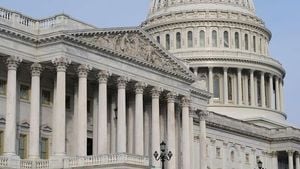South Korea's data protection regulator has raised alarms over the usage of the Chinese artificial intelligence startup DeepSeek's services, urging users to proceed with caution due to significant security concerns. On Friday, the Personal Information Protection Commission (PIPC) issued its advisory, which follows noticeable steps taken by various Korean government ministries to block internal access to DeepSeek amid growing unease about how the company manages sensitive data.
"Considering the continued security concerns posed during the use of DeepSeek's service, (we) advise using it with caution," stated the PIPC during its briefing. This caution stems from several inquiries made to DeepSeek concerning its policies on personal data collection, which were sent through multiple channels by the PIPC. The regulator has indicated its commitment to thoroughly analyzing the data being transmitted when DeepSeek's services are utilized.
The proactive measures taken by the PIPC reflect broader apprehensions about data security risks associated with foreign tech firms, particularly those originating from China. The advisory marks not only the recognition of threats posed by potential data mismanagement but also the increasing governmental scrutiny faced by foreign AI companies operating within South Korea. The concern is particularly poignant considering the sensitive nature of the data often involved with AI services.
These worries are rooted not only in DeepSeek's operations but also represent systematic fears about the handling of personal information by non-local entities. According to the PIPC, there are plans to establish concrete measures to enable safe utilization of technology services offered by DeepSeek without compromising personal data privacy. The commission has committed to seeking detailed responses from the AI startup to clarify its data handling practices.
Reflecting on these developments, the PIPC is also actively collaborating with data protection bodies globally, including Britain’s Information Commissioner’s Office, to bolster its knowledge and approach to international data regulations. Such cooperation is deemed necessary to understand potential ramifications of foreign AI technologies on local privacy standards.
Driven by the need for transparency, the PIPC has reached out to Chinese authorities through diplomatic channels. The regulator seeks to facilitate discussions centered on data protection laws as they pertain to international AI operations, aiming for increased accountability from DeepSeek.
The overall situation paints a complex picture not just for DeepSeek but also for other technology companies eyeing South Korea's lucrative market. The regulations and decisions taken by organizations and government bodies will likely push foreign companies to revisit their data strategies and operational transparency if they wish to succeed within the country.
For now, the advisory remains clear: users are being urged to tread carefully when engaging with DeepSeek's AI services as the nation prioritizes enhancing protections around personal data. This advisory does not only signify immediate security measures but also larger-scale implications for international relations and tech dynamics, particularly as nations grapple with the challenges introduced by global interconnectedness of technology and data.



